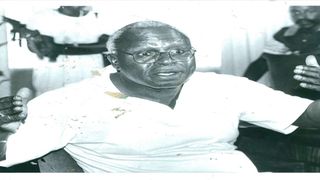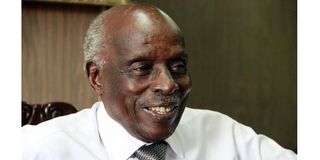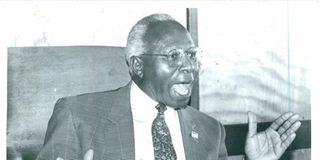
Mr Simeon Nyachae.
| File | Nation Media GroupNews
Premium
The other side of Simeon Nyachae
What you need to know:
Former Cabinet Minister and ex-Nyaribari Chache MP, Simeon Nyachae, has died at the age of 88.
His body is currently at the Lee Funeral Home in Nairobi.
In life, Mr Nyachae’s critics thought and openly dismissed him as arrogant and dictatorial – perhaps too pushy.
He was a man who easily crossed swords with those who crossed his path and did not suffer fools gladly.
When he reigned, Simeon Nyachae was arguably powerful – and from that lofty position, he harboured the dream of becoming Kenya’s president.
Nyachae lived within the precincts of raw power, both as a provincial administrator and as a Cabinet minister in the Moi regime. In exhibiting his might, Nyachae never disappointed.
In 1999, and in a surprise move, Nyachae had resigned from the Moi government after he viewed his removal from the Ministry of Finance as a demotion. Few ministers had such guts – and Nyachae instantly won the hearts of Kenyans opposed to the Moi rule.
When he died on Monday, February 1, 2021, at the age of 88, the only position he never got was the presidency, a dream that had seen him go solo in 2002 as the late President Daniel Moi finished his final term.
Nyachae is one of the last provincial administrators who served during the Jomo Kenyatta government, and his last station was in Nyeri before he was given the coveted position of Permanent Secretary in the Office of the President after Kenyatta’s death – replacing Jeremiah Kiereini.

Kiereni had taken over from the Kirinyaga-born Geoffrey Kariithi who had retired in Moi’s first year as president, a victim of the emerging backstabbing of newly-minted politicos who had joined fray after the 1979 general elections.
“He was quite conscious that Moi wanted another person of his own, so he did what was right and wrote a letter requesting retirement,” wrote Kiereini about Kariithi’s departure and his entry. But after five years in the job, Kiereini found his position threatened.
Most of his friends, including Charles Njonjo and Ben Gethi, had been kicked out of the government and Njonjo was going through an embarrassing Judicial Commission of Inquiry after allegations were made that he wanted to topple the Moi government. These allegations were made after a breakfast meeting that was hosted in Nyachae’s residence in Kisii where Moi was holding a rally.
“I felt that I was no longer in control of my docket. The chain of command had broken down, there was increasing political interference, all sorts of capricious decisions were taken and I was not accustomed to kowtowing to politicians,” Kiereini wrote later in his autobiography.
Thought to be 'untouchable'
It was after these frustrations that Nyachae’s path was crafted. The retirement, nay resignation, of Kiereini in July 1984 had given Nyachae a chance to be a key pillar in the construction of the Nyayo regime to an extent that he thought he was untouchable. But, as he found out later, he was not.
In 1980, the position of the mouthful Permanent Secretary, Head of Civil and Secretary to the Cabinet had been renamed Chief Secretary. In this position, first held by Kiereini, the holder was equivalent to a Cabinet minister and could run some ministerial departments. In Parliament, Busia MP Peter Habenga Okondo had warned that parliament was created a monster for the position, which he likened to that of Prime Minister.
“We are lucky that Kiereini is not a power hungry man. Just think of what would happen if this post was given to someone with greed for power.”
From 1984, Nyachae ran the civil service with a firm grip until 1986 when a constitutional amendment was passed that abolished the position of Chief Secretary.
Moi stated that it had increased bureaucracy, although this change was interpreted as a bid to tame Nyachae who was entrenching himself.
Eventually, Nyachae was sent on compulsory leave and he sent a post-dated retirement which was to take effect in 1987 when he attained the age of 55.
'Arrogant and dictatorial'
In life, Mr Nyachae’s critics thought and openly dismissed him as arrogant and dictatorial – perhaps too pushy. He was a man who easily crossed swords with those who crossed his path and did not suffer fools gladly. Because of that, Nyachae made several political mistakes and lost, forever, the chance of becoming Kenya’s president.

Born February 6, 1932 and son of assistant chief of Nyaribari location, his father was one of the first Africans to grow coffee in the region and this turned him to one of the richest Africans, by then colonial standards.
Like other chiefs, Nyachae’s father amassed lots of wealth, opened several commercial posho mills, had a car and motor-bike – long before Nyachae was born. It was in this silver spoon environment that the late Nyachae grew within a family linked to power.
His great-grandfather, too, was a local sansora, a man who settles disputes within the clan, and that gave Nyachae the chance to name his floor milling company Kabansora. Under Kabansora, Nyachae produced cereals, mills maize flour, and baked bread. He also had interests in banks.
Moi, Nyachae fallout
During his short period within the Nyayo government, Nyachae had become the figure behind Moi’s District Focus on Rural Development, which was Moi’s first attempt on devolution.
But the acrimonious departure was an indicator of how far Nyachae had fallen out of favour with the Nyayo government after only a short period.
The gap between Nyachae and Moi was finally seen during the 1988 general elections when he was denied a chance to contest on a Kanu ticket – at a time when that was the only party. He was also a victim of a vicious campaign against him.
It was a nasty end for a man who had entered public service after returning from Torquay College and Exeter University in 1958 – rising from a District Officer in Kangundo to become a Provincial Commissioner in both Rift Valley and Central Province.
But with multi-party politics threatening to remove Moi, he would rehabilitate Nyachae and relied on him to secure the Kisii vote. It was a position that would return him to the centrestage of Kenyan politics and became a powerful force in Moi’s Cabinet.
But this did not last long, too, after he resigned in a huff having been demoted from a Minister of Finance. But he had already made his mark and soiled his name too, within the Nyayo government.

Mr Simeon Nyachae.
In 1985, it was claimed that Nyachae’s Sansora Oil Mills was allocated an industrial plot to build an oil mill – next to Kisii Bottlers. It was opened by President Moi. Later on, in Parliament, Nyachae denied that he grabbed “public land” and refused to comment on documents that had been tabled.
“I do not wish to comment on a document, which was tabled on the basis of mischief,” he said.
In 1995 when he was Minister for Agriculture, Livestock Development and Marketing, Mr Nyachae was again forced to issue another personal statement after it was alleged in parliament that he had sold a plot in Kilifi’s Kijipwa Mainland to NSSF. But what emerged from his statement was that Sansora Investments Limited had acquired the plot in 1992 to build a hotel, but the company changed its investment policy and offered it for sale.
The plot was purchased by Sea View Investments which later sold it to NSSF. He said that the accusations “is the latest in a series of attempts by people who, for whatever reason, perceive me as their political enemy and who wish to drag me into the mud of public corruption.”
Like other mandarins in the Nyayo regime who found safety in starting banks, Nyachae had put his money in a tier III lender, Credit Bank, where he served as chairman. At one point, the Nyachae family, through Sansora Group Ltd, directly owned 21.46 per cent of the small lender.
Met his match
But it was in opposition politics that Nyachae was to meet his match. When he attempted to run for presidency, he was trounced by Narc’s Mwai Kibaki and Kanu’s Uhuru Kenyatta, and woke up to the reality of political brinkmanship that is Kenya’s politics.
Mr Nyachae had been nominated Ford People party leader on December 8, 2001 for a party that had attracted the likes of Kimani Wanyoike and Kipkalya Kones, and which was supposed to the base of a third national alliance.
When Kanu was on the verge of breaking up, thanks to President Moi’s determination to have Uhuru Kenyatta as his successor, Mr Nyachae - rather than join the Raila Odinga-led alliance that was emerging within Kanu - decided to craft his own with hopes that he would be nominated as a candidate. Raila palyed games on him and emerged in Uhuru Park where he endorsed Mwai Kibaki.
While the Kisii community voted for Nyachae as a bloc, the former PS only managed a paltry 345,000 votes compared to Mr Kibaki’s 3.6 million. His Ford-People party, a special-purpose political party he had hiked from the late Kimani Wanyoike, managed 14 seats in parliament. While this gave him a bargaining slot – and he managed to enter President Kibaki’s Cabinet, Mr Nyachae’s parliamentary career ended there and he was humiliated in 2007 when he tried to capture the Nyaribari Chaache seat against a youthful Dr Robert Onsare Monda.
End of influence
After that, Mr Nyachae was not only forced to hang his political boots but also, the defeat ended his family’s influence on Abagusii politics where they had hoped to reign following the administrative trail left by their father - Senior Chief Musa Nyandusi.
Once, he told parliament that he does not fear wananchi and that even when he was Minister for Finance, he did not carry weapons: “I was licensed to have a gun in 1961, but I have never carried it. Even during weekends, I never carry a gun or bodyguard. I drive myself, I go round freely, and, therefore I do not need a gun. It is there and I never carry it.”
The other side of Nyachae emerged when he returned his diplomatic passport and took an ordinary one.
“The greatest enjoyment I have found is not to be recognised by anybody. I only want my wife to know that she is with me. I do not want people to recognise me as a diplomat…I just want a simple passport to take me anywhere I want. But if you have a diplomatic passport, then you are actually unsafe in foreign countries, because they want to know where you are. I do not want to be half a slave.”
That was during the 1998 debate when MPs wanted the government to issue them with diplomatic passports, armed security and firearm licences.
But it was the rare admission that Kenya was broke that earned him accolades and his decision to quit. He had said that the pending bills had reached a high of Sh7 billion and proposed that civil service be trimmed by about 20 per cent to help jump-start the economy. He wanted the number of teachers to be cut since the Ministry of Education was taking 40 per cent of the entire budget.
After that, Ugenya MP James Orengo warned him to be wary of ‘hyenas’ who were surrounding him – and as Kiereini had warned, his time to be devoured had come.





